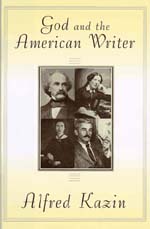 (Reprinted with permission from Review of Contemporary Fiction, written by Thomas Hove.)
(Reprinted with permission from Review of Contemporary Fiction, written by Thomas Hove.)
Early on in this informal study, the late Alfred Kazin explains that he is “interested not in the artist’s professions of belief but in the imagination he brings to his tale of religion in human affairs.” For their exemplary treatments of this tale, Kazin singles out Hawthorne, Emerson, Stowe, Melville, Whitman, Lincoln, Dickinson, William James, Twain, Eliot, Frost, and Faulkner.
His critical approach consists mainly of paraphrasing fundamental texts from the American canon and providing biographically informed commentary. Often, he will also interject illuminating literary comparisons or historical anecdotes, and he frequently manages to sum up the most salient features of a writer’s thought and style with dazzling economy. In some cases Kazin merely goes over familiar ground, as in his chapters on Hawthorne and Eliot. But in others, his paraphrases manage to perform at least two important tasks of criticism: to explain why a writer’s works are worth reading and to inspire the reader to experience those works directly, whether for the first or the fiftieth time. Kazin is most inspiring when he discusses the literature of the Civil War, particularly Lincoln’s speeches. For varying reasons, his other favorites are the tormented agnostics Melville, Dickinson, and Faulkner. Those looking for a broader and more systematic study of religion and American literature might be more satisfied by Andrew Delbanco’s The Death of Satan. But Kazin’s book should satisfy those who want to see how a particularly sensitive and eloquent reader engages with works he continues to find, in his ninth decade of life, important.